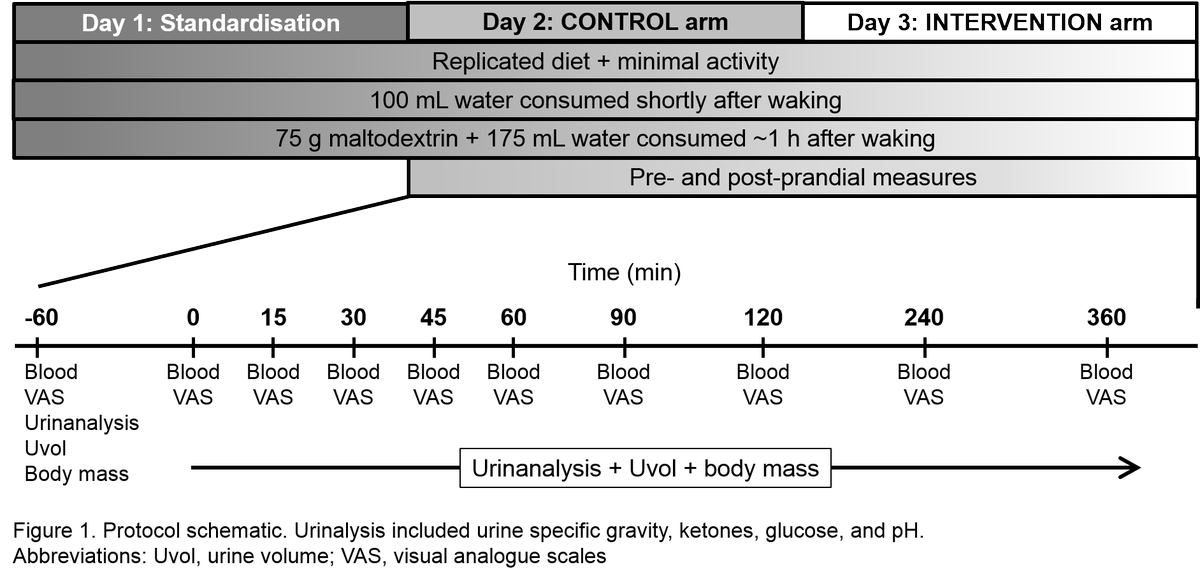full talk (poor sound qual) can be found here:
1/21
current #publichealth guidelines target reducing sugar
2/21
breakfast is the highest #sugar meal of the day so a good meal to target to reduce total sugar.
breakfast = complex to define, but broadly breaks the overnight fast (break-fast) 3/21
pubmed.ncbi.nlm.nih.gov/18633111/ 5/21
pubmed.ncbi.nlm.nih.gov/6364839/
early insulin responses = healthier blood sugar regulation
pubmed.ncbi.nlm.nih.gov/11063282/ 6/21
ncbi.nlm.nih.gov/pmc/articles/P…
stronger glucose/insulin responses = greater (acute) satiety
pubmed.ncbi.nlm.nih.gov/11477506/
pubmed.ncbi.nlm.nih.gov/12399274/
so maybe: morning = ↑ sweet taste = ↑ insulin = ↑ satiety? 7/21
in the brain, they help regulate appetite, and this gets disrupted with #obesity
pubmed.ncbi.nlm.nih.gov/27388805/ 8/21
ncbi.nlm.nih.gov/pmc/articles/P…
GLP-1 is a satiety hormone (makes you feel full), an incretin hormone (stimulates insulin), and reduces food reward (so you don't *want* to eat more) 9/21
pubmed.ncbi.nlm.nih.gov/19352508/
and stimulation of these receptors may help prevent pancreatic beta cell (the cells that produce insulin) death
ncbi.nlm.nih.gov/pmc/articles/P… 10/21
journals.physiology.org/doi/full/10.11… 12/21
to put this in context: 2 cans of coke = ~75 g sugar. ~50 % of this sugar is #fructose (doesnt effect #bloodsugar). 13/21
in a breakfast context - of 101 UK breakfast cereals i looked at, @KelloggCompany Frosties had the highest #sugar (37 % by weight). if you had a large portion (50 g) + 250 mL semi skimmed milk = ~30 g sugar 14/21
also consider:
1. ~half the sugar will be fructose = doesn't affect your #bloodsugar
2. the sugars are in a food matrix = slower digestion, some won't get absorbed, etc 15/21
(in healthy adults) 16/21
1. #carbohydrate and #sugar are inversely associated with #obesity
onlinelibrary.wiley.com/doi/epdf/10.11…
2. when people cut out sugar and lose #weight, they have just cut total calories (ie. nothing magic about sugar)
bmj.com/content/346/bm… 17/21
pubmed.ncbi.nlm.nih.gov/19207533/
to top it off, my research showed 3 wk plain vs sweet (same calorie, 30 % by weight sugar) #breakfast had NO DIFFERENCE in:
onlinelibrary.wiley.com/doi/full/10.10…
18/21
❌energy intake
❌physical activity
❌fasted biomarkers of health (glucose, TAG etc)
❌fasted appetite hormones (GLP-1, FGF21)
❌psychological approach to food
❌cravings
❌liking of plain or sweet porridge
❌*post-breakfast sugar intake*
19/21
✅after sweet breakfast a REDUCTION for sweet desire (back to baseline levels by lunch (as predicted by sensory specific satiety)
20/21
if you need to lose weight, targeting any nutrient or meal can do the trick; for some this might be cutting #breakfast or #sugar 21/21
preempting based on experience - before critiquing, please consider if this evidence showed eg low carb was ok, would you accept it as good enough evidence?





